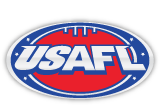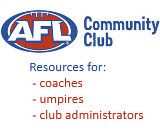Feature Article on Tom & Charlie Ellis
G'day, mates!
By Benn Farrell, Sports Writer

Parker brothers Charlie Ellis and Tom Ellis have been playing Australian rules football, or ÔfootyÕ as it is sometimes referred to, since 1999 on the inaugural Denver Bulldogs team. The duo recently represented America in the second International Cup in Melbourne, Australia, as teammates on the American Revolution team.
The brothers Ellis may not be from Australia, but as far as football goes they both play like it - rough.
Tom and Charlie Ellis of Parker had a pinnacle year for sports involvement in 2005 when both men were selected to play for the American Revolution, the United States' Australian football team.
As a part of the Revolution, the Ellis brothers helped the U.S. team win third place over Ireland in August 2005 at the sport's second International Cup in Melbourne, Australia.
The Ellis brothers began playing Australian football in 1999 during the Denver Bulldogs inaugural year. Their first game was during a Kansas City tournament. Since then, the pair has helped the Bulldogs win five national titles the last six years under the USFooty League. The team has made seven trips into the championship game. The Bulldogs took their most recent national title in Milwaukee, Wis. last October.
Australian football calls for 18 players on the field for each team. The field of play can range 160 to 180 yards long by 110 to 120 yards wide. It's referred to as an oval in the sport's native land. The positions of the players are much like those of soccer, Tom Ellis said.
For fans, the game looks like a hybrid between football, rugby and soccer, except Aussie football players wear no pads and there is no such thing as unnecessary roughness when it comes to catching the ball.
"The difference with Australian football is you have to get rid of the ball," Tom said. "You don't get any more injuries than the usual bumps and bruises. The injuries are no more dramatic than ones in soccer."
Tom has been healthy through his years of Aussie football, with the exception of a minor sprain. Charlie, on the other hand, suffered a broken nose his first year. He was in the second game of tournament action when he sustained the injury; however, the younger Ellis went on to play four more games in that event.
"Of all the Americans playing the sport right now, I'd have to say Charlie is the best," Tom said.
The Ellis brothers are five years apart in age. Tom, 37, is the elder but the seventh sibling in a family of nine. Charlie, 33, is the youngest of the family.
They are originally from Colorado Springs and raised in Texas; however, the two frequented Colorado during the summers of their rearing. Tom now lives in Parker with his wife and two children, a boy and girl, while Charlie lives about a mile from him with his wife and stepdaughter.
The brothers Ellis have always had sports in their lives. Since their respective years in junior high school, through secondary and into college, they have devoted a portion of their lives to a handful of sports; however, it wasn't until Tom and Charlie were adults that they got to play together.
In college, Tom was able to pole vault with his school's track and field team, while Charlie played football. Once the two were settled in Colorado, they quickly found adult flag football and softball leagues to make up for their post-college urge for competition.
They even spent 1998 and 1999 in the semi-professional Colorado Football Conference as members of the Denver Titans.
It was in 1997 when a friend named Matt Dainauski introduced them to Australian football and a local team he started.
In the first year of competition, both Tom and Charlie were selected for the American Revolution national team, and they've been selected every year since.
Tom said the differences between Australian football and the American norm is the amount of running involved.
"The amount of running is tough at first, but after the first few times you get used to it," Tom said. "It'll make you a pretty fit person. That's one of the thing I like about the sport is the amount of athleticism involved.
"You don't have that offensive lineman sized guy out there. If you're that size, with all the running involved, you're going to lose weight and change the look of your body. Everyone has to be able to kick, catch and hand pass the ball."
Of course, with a high amount of running, the sport requires the Ellis brothers or any other player, to have a good amount of cardiovascular training.
"It's the difference between long distance running and having to run in spurts," Ellis said. "There is some weight training involved also, since you're constantly pushing yourself off the ground. We train in light weights with high intervals."
In 2002, Melbourne hosted the sport's first International Cup at which the American Revolution made an appearance.
Tom said Melbourne is the Mecca of Australian football, but event organizers did not expect the visiting competition to be at the high level it was. Teams like the Revolution came to play, including Ireland, whose team won the cup.
The 2005 International Cup, however, made the world of Australian football take a serious look at the Americans.
"This last cup was much better since the Australians knew what kind of teams they were actually playing this time," Tom said.
In pool play, the Revolution defeated the Irish, who at the time remained undefeated, by a single point.
Later in tournament play, the Revolution faced Ireland once again for third place. Proving their earlier win was no fluke, the U.S. team squashed the Irish the second time around.
The next International Cup will be in 2008 when Melbourne celebrates the 150-year anniversary of Aussie football with a large-scale festival. After which, the International Cup will be every four years, like World Cup soccer.
In December 2005, Tom was named coach of the American Revolution and will lead the team for pre-season action on Jan. 16 at the University of California-Los Angeles.
The Revolution will face the Sydney Swans, which won the 2005 International Cup, and the North Melbourne Kangaroos, which finished second. Swans coach Paul Roos was also the first coach of the Revolution in 1999.
Back in Colorado, the Denver Bulldogs' season runs from May to October, minus a couple of breaks. The team participates in two seasons - a traveling schedule and a metro league schedule.
The team's traveling schedule consists of two or three stops around the country where other teams congregate to play games over a single weekend. The upcoming season will take the Bulldogs to California, Arizona and back to Milwaukee, Wis.
The metro league consists of a smaller version of the game where teams whittle themselves down to 9-on-9, playing on a soccer field. Tom Ellis said the metro league is the Bulldogs way of introducing new athletes to the sport, and it also serves as an outlet for those players who cannot afford to travel with the team.
Ellis also said the team's roster bears 60 names, but only 35 are consistently active. About 20-25 of the players are American, while 10-15 are from Australia. Players come from as far south as Colorado Springs and as far north as Fort Collins and Boulder. Ten of the team's athletes come from south metro Denver neighborhoods.
For more information on the Denver Bulldogs, visit the team's Web site at www.denverbulldogs.com, and for more information on Australian football in the United States and the American Revolution visit www.usfooty.com.
- Benn Farrell
(616)
|
|
|






